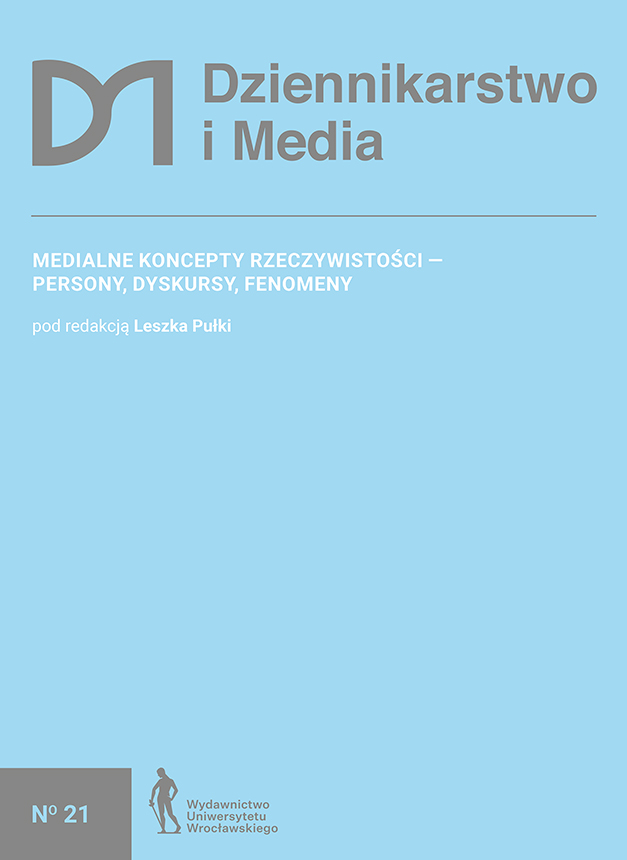

Articles

The article is an attempt to investigate the phenomenon of true crime podcasts, paying particular attention to their consumers. It presents the history of the genre (true crime) and compares it to traditional crime fiction. Podcast (the form of true crime’s communication) is described and put in opposition to regular radio. In order to reach the motives of the recipients of the studied phenomenon, the article describes the impact of the civilization process on the change of instincts and internal human imperatives. The main focus is put on the gradual disappearance of natural aggression. In comparison with theories of contemporary researchers of the genre, the text presents two theses, casting a new perspective on the needs of true crime audiences.
Boling, K. (2019). True crime podcasting: Journalism, justice or entertainment?. Radio Journal: International Studies in Broadcast & Audio Media, 17 (2).
Burger, P. (2016, 24 sierpnia). The Bloody History of the True Crime Genre. JSTOR Daily. Dostęp 9 marca 2020 z https://daily.jstor.org/bloody-history-of-true-crime-genre/.
Burke, E. (1757). A Philosophical Enquiry into the Origin of Our Ideas of the Sublime and the Beautiful. W U. Eco (1996), Superman w literaturze masowej. PIW.
Chmielewski, A. (2001). Od tłumacza. W S. Žižek (2001), Przekleństwo fantazji. Wydawnictwo Uniwersytetu Wrocławskiego.
Clausen, L.S., Sikjær, S.A. (2021). When Podcast Met True Crime: A Genre-Medium Coevolutionary Love Story. Leviathan: Interdisciplinary Journal in English, (7), 139–214, https://doi.org/10.7146/lev.v0i7.125213.
CSI: Crime Scene Investigation Becomes The Most-Watched Show Again. Dostęp 3 maja 2022 z https://mysterytribune.com/csi-crime-scene-investigation-become-most-watched-crime-show/.
Drelich, S. (2021). Rewolucja jako narzędzie emancypacji w myśli społeczno-politycznej Slavoja Žižka. Athenaeum. Polskie Studia Politologiczne, 69 (1).
Eco, U. (1996). Superman w literaturze masowej. PIW.
Elias, N. (2011). O procesie cywilizacji. WAB.
Goban-Klas, T. (2006). Radiomorfoza w kontekście ewolucji, adaptacji i konwergencji mediów. Studia Medioznawcze, 26, 20.
Godyń D. (2019, grudzień). Noir i neo-noir. Linia Prosta. Dostęp 25 marca 2024 z https://liniaprosta.com/noir-i-neo-noir/.
Goldberg, K. (2017, 15 grudnia). The 2017 Discover Pods Awards Winners. Discover Pods. Dostęp 3 maja 2022 z https://discoverpods.com/2017-discover-pods-awards-winners/.
Gorer G. (1979). Pornografia śmierci. Teskty, 3 (45), 197–203.
Gray, C. (2023, 1 czerwca). Best Podcast Directory List: How to Get Your Show Everywhere. The Podcast Host. Dostęp 25 lipca 2023 z https://www.thepodcasthost.com/promotion/best-podcast-directories-where-to-list/.
Helman, A. (1990). Film gangsterski. Wydawnictwa Artystyczne i Filmowe.
Illouz, E. (2015). Hardkorowy romans. Pięćdziesiąt twarzy Greya, bestsellery i społeczeństwo. PWN.
Kuang, R.F. (2023). Babel. Czyli o konieczności przemocy. Fabryka Słów.
Laplanche, J., Pontalis, J.B. (1996). Słownik psychoanalizy. Wydawnictwa Szkolne i Pedagogiczne.
Laqueur, T.W. (2006). Samotny seks. Kulturowa historia masturbacji. TAiWPN Universitas.
Lasić, S. (1976). Poetyka powieści kryminalnej. PIW.
Lewiński, D. (2017). Bestsellery a struktury społeczne. W D. Lewiński, K. Stasiuk-Krajewska, R. Wróblewski (Red.), Graszewicz.com Media Komunikacja Kultura. Wydawnictwo Libron.
Luhmann, N. (2007). Systemy społeczne. Wydawnictwo Nomos.
Markman, K.M., Sawyer, C.E. (2014). Why Pod? Further Explorations of the Motivations for Independent Podcasting. Journal of Radio and Audio Media, 21 (1), 20–35.
Marsons A. (2020, 9 czerwca). Breaking the rules. The Strand Magazine. Dostęp 5 marca 2022 z https://strandmag.com/breaking-the-rules/.
Matuszek, K.C. (2010). Systemy wojenne. Współczesne wojny w perspektywie teorii Niklasa Luhmanna. WAM.
Mbembe, A. (2018). Polityka wrogości. Karakter.
Paczyńska-Jasińska, P. Femme fatale w kinie noir. Strefa Kultur Uniwersytetu SWPS. Dostęp 2 maja 2022 z https://web.swps.pl/strefa-kultur/artykuly/418-kultura/18091-femme-fatale-w-kinie-noir?dt=1651510928303.
Palmieri, L. (2016, 8 września). A Psychiatrist Explains What Your True Crime Obsession REALLY Says About You. Decider. Dostęp 4 kwietnia 2022 z https://decider.com/2016/09/08/psychiatrist-explains-true-crime-obsession/.
Season 1 — CSI: Crime Scene Investigation. Dostęp 3 maja 2023 z https://www.rottentomatoes.com/tv/csi_crime_scene_investigation/s01.
Serial „W11 — Wydział śledczy”. Dostęp 3 maja 2022 z https://www.filmweb.pl/serial/W11+-+wydzia%C5%82+%C5%9Bledczy-2004-208863.
Stachyra, G. (2016). Podcasting w perspektywie specyfiki produkcji radiowej. Media — Kultura — Komunikacja Społeczna, 4 (12).
The Nielsen Company (2021, luty). Podcasting today. Insights for advertisers. Dostęp 25 lutego 2021 z https://www.nielsen.com/pl/insights/2021/podcasting-today-2/.
Thomas, L.V. (2001). Trup. Wydawnictwo Łódzkie.
Thorp, C. (2019, 9 września). Why are we obsessed with true crime? The Telegraph. Dostęp 31 marca 2022 z https://www.telegraph.co.uk/tv/a-confession/why-do-we-love-true-crime/.
Vicary, A.M., Fraley, R.C. (2010). Captured by True Crime: Why Are Women Drawn to Tales of Rape, Mur der, and Serial Killers? Social Psychological and Personality Science, 1 (1), 81–86, https://doi.org/10.1177/1948550609355486.
Włodek, P. (2015). „Świat był przemoczoną pustką”. Czarny kryminał Raymonda Chandlera w literaturze i filmie. Wydawnictwo Naukowe Uniwersytetu Pedagogicznego.
Włodek, P. (2017). Cold-noir. Czarny kryminał i Skandynawia. Panoptikum, 17 (24).
„W11” i „Detektywi” straciły widzów. Dostęp 3 maja 2022 z https://www.wirtualnemedia.pl/artykul/w11-i-detektywi-stracily-widzow.
Žižek, S. (2001). Przekleństwo fantazji. Wydawnictwo Uniwersytetu Wrocławskiego.
Žižek, S. (2010). Przemoc. Sześć spojrzeń z ukosa. Warszawskie Wydawnictwo Literackie Muza.
https://podcasts.apple.com/us/podcast/casefile-true-crime/id998568017.